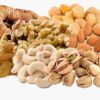
Dates: A Sweet Journey Through History and Health
Dates, the luscious and sweet fruit that has been a staple in diets across cultures for centuries, offer not only a delightful taste but also a plethora of health benefits. From their ancient origins to their modern-day popularity, dates have played a significant role in various cuisines and have earned a reputation as a nutritious and versatile snack. In this blog, we will explore the fascinating journey of dates through history, their cultural significance, and the numerous health advantages they bring to the table.
A Historical Sweet Spot:
Dates have a rich history dating back thousands of years. Originating from the Middle East, these small, wrinkled fruits have been cultivated since ancient times in regions such as Mesopotamia and the Indus Valley. The date palm, the tree that produces dates, was considered a symbol of abundance and life in many ancient cultures. Egyptians, for example, regarded dates as a symbol of fertility and used them in various religious ceremonies.
Culinary and Cultural Significance:
Dates have been a culinary delight in various cultures, featuring prominently in Middle Eastern, Mediterranean, and North African cuisines. They are not only consumed as a standalone snack but also integrated into a wide array of dishes, both sweet and savory. The sticky sweetness of dates adds depth to desserts, while their natural sugars make them a popular alternative to refined sugars in baking.
Beyond their culinary uses, dates hold cultural significance in many societies. In the Islamic tradition, dates are often consumed to break the fast during Ramadan, symbolizing the tradition of Prophet Muhammad. Additionally, they are exchanged as gifts during special occasions, representing hospitality and goodwill.
Nutritional Powerhouse:
Apart from their delicious taste and cultural importance, dates are a nutritional powerhouse. Packed with essential nutrients, dates offer a concentrated source of energy, fiber, and various vitamins and minerals. They are particularly rich in potassium, magnesium, vitamin B6, and iron. The natural sugars found in dates provide a quick energy boost, making them an excellent choice for a pre-workout snack or a pick-me-up during a busy day.
Health Benefits:
1. Digestive Health: The high fiber content in dates promotes digestive regularity and helps prevent constipation.
2. Heart Health: Potassium and magnesium in dates support heart health by regulating blood pressure and reducing the risk of cardiovascular diseases.
3. Bone Health: The combination of minerals in dates, including phosphorus, calcium, and magnesium, contributes to strong and healthy bones.
4. Iron Boost: Dates are an excellent source of iron, making them beneficial for individuals with iron-deficiency anemia.
5. Antioxidant Properties: Dates contain various antioxidants that help combat oxidative stress and inflammation in the body.
Incorporating Dates into Your Diet:
Adding dates to your diet is simple and delicious. They can be enjoyed on their own, stuffed with nuts, or incorporated into both sweet and savory dishes. Try blending dates into smoothies, chopping them into salads, or using them as a natural sweetener in recipes.
Conclusion:
Dates are more than just a tasty treat; they are a symbol of cultural heritage, a testament to the rich history of the regions where they originated, and a powerhouse of nutrition. Whether you savor them for their sweet flavor or reap the health benefits they offer, dates are a timeless fruit that continues to captivate our taste buds and nourish our bodies. So, the next time you reach for a snack, consider the humble date – a small fruit with a sweet history and a big impact on your well-being.




